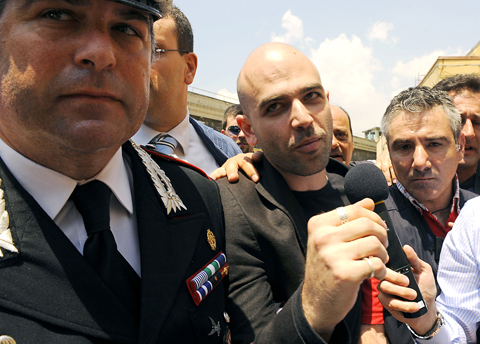An Italian appeals court meted out 16 life sentences on Thursday to bosses of a powerful mafia clan from the Naples region, following one of the biggest trials in the country’s history.
The so-called Spartacus trial involved 36 defendants, all linked to the Casalesi clan from the southern Casal di Principe area near Caserta. The defendants were appealing prison sentences handed down in late 2005.
On top of the life sentences, 14 of the others received sentences of between two and 30 years behind bars.

PHOTO: AFP
The verdict was received with “great satisfaction” by Italian Interior Minister Roberto Maroni and across the political spectrum.
The court followed the recommendations of the prosecution in pronouncing its verdict for the accused, who include the alleged head of the clan, Francesco “Sandokan” Schiavone.
Among the many accusations was murder — namely by mafia bosses Francesco Bidognetti, Michele Zagaria, and Antonio Iovine, as well as Schiavone, who has been in a high security prison since 1998.
Zagaria and Iovine are still on the run.
Extreme security measures were taken for the trial, with the court housed in a top security prison in the Poggioreale district of Naples. Only two of the defendants — locked in “cages” — were in the heavily guarded courtroom to hear the verdict. Others followed it via videolink from their prison cells.
Some 500 witnesses testified in the Spartacus trial, which opened in 1998 in Santa Maria Capua Vetere north of Naples, including about 20 mafia turncoats who gave key evidence against their former partners in crime.
A dramatic trial saw five people involved in the case — including an interpreter — assassinated, as well as a judge and two journalists threatened during hearings.
These episodes are part of the clan’s “strategy of terror” that could continue after the trial is finished, a parliamentary mafia commissioner, former senator Lorenzo Diana, said.
“The clan is scared,” mafia author Roberto Saviano wrote in the daily La Repubblica on Wednesday. Saviano wrote the book Gomorra, which revealed the incredible reach of the Camorra clans.
The writer has had to live with a police escort since 2006. He attended the court verdict to show he was “not afraid,” he said.
While Saviano said the verdict was a “victory of justice,” he warned the state not to “let down its guard” against the Camorra.
By means of a territorial war that has cost some 1,000 lives in 30 years, the Casalesi criminal cartel has progressively spread its reach.
Saviano described the Casalesi as “a confederation grouping all the Camorra families from the province of Caserta,” comprised of “violent heads of business, murderous managers ... all with their own army and all linked by economic interests in most sectors.”
According to the investigation, the power and activities of the clan span beyond Italy’s borders and extend to eastern Europe and include the trafficking of drugs, arms and toxic waste, as well as prostitution.
Several cases that fall under Spartacus are still under investigation, delving into the clan’s political and legal links.

Airlines in Australia, Hong Kong, India, Malaysia and Singapore yesterday canceled flights to and from the Indonesian island of Bali, after a nearby volcano catapulted an ash tower into the sky. Australia’s Jetstar, Qantas and Virgin Australia all grounded flights after Mount Lewotobi Laki-Laki on Flores island spewed a 9km tower a day earlier. Malaysia Airlines, AirAsia, India’s IndiGo and Singapore’s Scoot also listed flights as canceled. “Volcanic ash poses a significant threat to safe operations of the aircraft in the vicinity of volcanic clouds,” AirAsia said as it announced several cancelations. Multiple eruptions from the 1,703m twin-peaked volcano in

China has built a land-based prototype nuclear reactor for a large surface warship, in the clearest sign yet Beijing is advancing toward producing the nation’s first nuclear-powered aircraft carrier, according to a new analysis of satellite imagery and Chinese government documents provided to The Associated Press. There have long been rumors that China is planning to build a nuclear-powered aircraft carrier, but the research by the Middlebury Institute of International Studies in California is the first to confirm it is working on a nuclear-powered propulsion system for a carrier-sized surface warship. Why is China’s pursuit of nuclear-powered carriers significant? China’s navy is already

Chinese President Xi Jinping (習近平) launched a week-long diplomatic blitz of South America on Thursday by inaugurating a massive deep-water port in Peru, a US$1.3 billion investment by Beijing as it seeks to expand trade and influence on the continent. With China’s demand for agricultural goods and metals from Latin America growing, Xi will participate in the APEC summit in Lima then head to the Group of 20 summit in Rio de Janeiro next week, where he will also make a state visit to Brazil. Xi and Peruvian President Dina Boluarte participated on Thursday by video link in the opening

IT’S A DEAL? Including the phrase ‘overlapping claims’ in a Chinese-Indonesian joint statement over the weekend puts Jakarta’s national interests at risk, critics say Indonesia yesterday said it does not recognize China’s claims over the South China Sea, despite signing a maritime development deal with Beijing, as some analysts warned the pact risked compromising its sovereign rights. Beijing has long clashed with Southeast Asian neighbors over the South China Sea, which it claims almost in its entirety, based on a “nine-dash line” on its maps that cuts into the exclusive economic zones (EEZ) of several countries. Joint agreements with China in the strategic waterway have been sensitive for years, with some nations wary of deals they fear could be interpreted as legitimizing Beijing’s vast claims. In 2016,